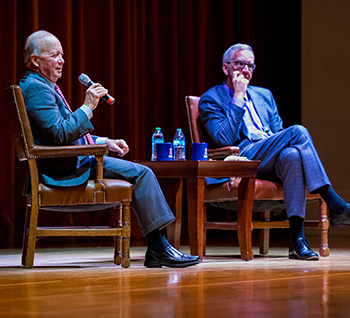Oct 14, 2024
Former governor Daniels speaks to Illinois students about fiscal policy and leadership
Mitch Daniels, former two-term governor of Indiana and the 12th president of Purdue University, spoke to a crowd of nearly 700 at Foellinger Auditorium on the campus of the University of Illinois Urbana-Champaign on October 2, 2024. During the fireside chat, which was co-sponsored by Gies’ Center for Business and Public Policy and The Academy on Capitalism & Limited Government, Daniels discussed the importance of budgets, sound fiscal policy, and student education. The conversation, which was only scheduled last one hour, continued for nearly two hours as dozens of students stayed late to ask their questions of Daniels.
“A mature country doesn’t favor today over tomorrow. It doesn’t take care of ourselves at the expense of our children,” Daniels said, in response to a question about fiscal policy. “When the government is running extraordinarily large debts, that leads to lots of consequence. It squeezes discretionary expenses and threatens our safety and security.”

Prior to becoming governor, Daniels served as chief of staff to Senator Richard Lugar, senior advisor to President Ronald Reagan, and director of the Office of Management and Budget under President George W. Bush. He was elected governor of Indiana in 2004 in his first bid for any elected office. He was then re-elected with more votes than any candidate in the state's history. As governor, Daniels implemented a fiscal policy that prioritized balanced budgets, significant tax cuts, and the reduction of state debt.
“It is irresponsible for the government to borrow undue amounts of money. It’s dangerous, and in my mind, it raises moral questions,” Daniels said. “If you are going to borrow money, you have to invest it in our future – in infrastructure or in an investment that will pay a return.”
Daniels also reflected on his time as president of Purdue University from 2013-2022. During that time, he implemented several impactful initiatives aimed at enhancing the university's academic reputation and financial stability. Under his leadership, Purdue eliminated student fees, froze tuition for several years, and emphasized the importance of STEM education, resulting in increased enrollment in these fields. He also navigated the university through the COVID pandemic and made a number of difficult decisions. He offered advice to the students in the audience who may be considering a future leadership position.
“Ask yourself ‘Why do I want to hold this position? What would I do if I did?’ The reason has to be the betterment of the lives or condition of others. That should be your resolution,” Daniels said. “You have to approach matters with candor and optimism. Without that, it’s just self-defeating. As president at Purdue, it was possible for me to tell people that we were making tough decisions we wish we didn’t have to make. I emphasized that it was in the common interest of us all. There will be consequences that people won’t like. You have to accept criticism and hard feelings that come with the territory.”
And while the discussion did not talk about politics or political candidates specifically, Daniels did take the opportunity to address the increased polarization of society.
“We cannot surrender to that polarization,” he urged students. “Weariness with our division is growing. We need to come together as a society. I was proud that I never ran a negative campaign ad toward my opponent, and I think more people need to come around to that way of thinking.”
Daniels urged students to think about how business can elevate that discourse and elevate society. In Daniels’ experience, what successful businesspeople are most proud of is the opportunities they provide and the jobs they create because of their talent and their innovative skill. “That’s the engine that makes everything else run.”
“It is important that young people understand how noble a career in business is,” he said. “When a young person leaves medical school you tell them, ‘You take these skills you just learned out in the world you’re going to make life better for other people.’ Someone else who aspires to a career in enterprise ought to feel exactly that way. “
